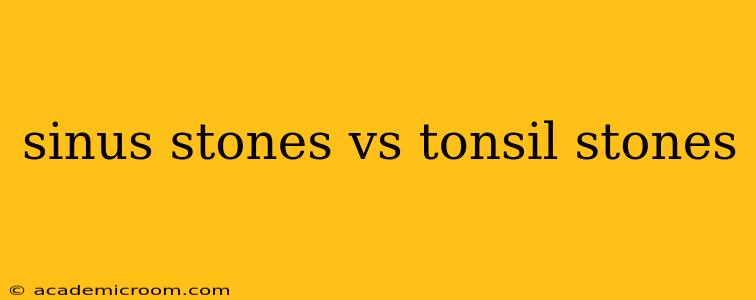Both sinus stones and tonsil stones can cause discomfort and worry, but they are distinct conditions affecting different parts of the body. Understanding their differences is crucial for proper diagnosis and treatment. This article will clarify the key distinctions between sinus stones (which are actually a misnomer – see below) and tonsil stones, addressing common questions and concerns.
What are "Sinus Stones"? The Reality of Sinus Issues
The term "sinus stones" is often used colloquially, but it's inaccurate. There are no actual "stones" that form in the sinuses. What people often refer to as sinus stones are likely other issues, such as:
- Sinus infections (sinusitis): This is an inflammation of the sinus cavities, often caused by a viral, bacterial, or fungal infection. Thick mucus builds up, potentially leading to pain, pressure, and congestion.
- Mucus buildup: Even without an infection, excessive mucus buildup in the sinuses can cause discomfort and a feeling of fullness.
- Sinus polyps: These are benign, noncancerous growths in the sinuses that can obstruct airflow and cause similar symptoms to sinusitis.
- Dental issues: Sometimes, problems with the upper teeth or gums can mimic sinus symptoms.
Therefore, instead of focusing on "sinus stones," it's more accurate to understand the various conditions that cause symptoms resembling the presence of stones. Understanding the underlying cause is essential for effective treatment.
What are Tonsil Stones?
Tonsil stones, also known as tonsilloliths, are small, hard masses that can form in the crevices (crypts) of the tonsils. They are composed primarily of calcium salts, debris, bacteria, and dead cells. They can range in size from tiny specks to larger formations, and often appear yellowish or white.
What causes tonsil stones?
Several factors contribute to the formation of tonsil stones, including:
- Poor oral hygiene: Inadequate brushing and flossing can allow bacteria and debris to accumulate in the tonsil crypts.
- Chronic tonsillitis: Repeated infections can lead to inflammation and debris buildup within the tonsils.
- Tonsil size and structure: Individuals with larger tonsils or tonsils with deeper crypts may be more prone to tonsil stone formation.
- Dry mouth: Decreased saliva production can reduce the natural cleansing action of the mouth, facilitating the accumulation of debris.
Sinus Stones vs. Tonsil Stones: A Comparison
| Feature | Sinus "Stones" (Actual Conditions) | Tonsil Stones (Tonsilloliths) |
|---|---|---|
| Location | Sinus cavities | Tonsil crypts |
| Composition | Mucus, pus, inflammatory cells (in sinusitis), polyps | Calcium salts, debris, bacteria, dead cells |
| Appearance | Not visible externally; symptoms include pressure, pain, congestion | Often visible as small, whitish or yellowish masses in the tonsils |
| Symptoms | Facial pain, pressure, headache, nasal congestion, fever (if infection) | Bad breath (halitosis), sore throat, white spots in the throat |
| Treatment | Varies depending on the underlying cause; may include antibiotics, decongestants, corticosteroids, surgery | Varies; may include rinsing, removal by a doctor, tonsillectomy |
How are Sinus and Tonsil Problems Diagnosed?
Diagnosing sinus issues typically involves a physical examination, possibly including an X-ray or CT scan to visualize the sinuses. Tonsil stones are often visible during a physical examination. A doctor may also use a swab to check for bacteria if an infection is suspected.
How are Sinus and Tonsil Problems Treated?
Treatment for suspected "sinus stones" (actual sinus conditions) depends on the underlying cause. It may involve antibiotics for bacterial infections, nasal corticosteroids for inflammation, decongestants to relieve congestion, or in severe cases, surgical intervention.
Tonsil stone treatment ranges from simple home remedies like gargling and irrigating the mouth to professional removal by a doctor or, in severe cases, tonsillectomy.
Frequently Asked Questions (FAQs)
Can tonsil stones cause sinus problems?
No, tonsil stones themselves do not directly cause sinus problems. However, if you have both tonsil stones and sinusitis, these may share a common cause, such as poor overall oral and respiratory health.
Are tonsil stones dangerous?
Most tonsil stones are not dangerous, but large stones can cause discomfort or infection. Persistent stones may warrant a visit to an ENT doctor.
Can sinus infections cause bad breath?
While sinusitis itself doesn't usually cause halitosis (bad breath), post-nasal drip from the sinuses can contribute to a bad taste in the mouth which might be associated with bad breath.
This article provides general information and should not be considered medical advice. Always consult a healthcare professional for diagnosis and treatment of any medical condition.
